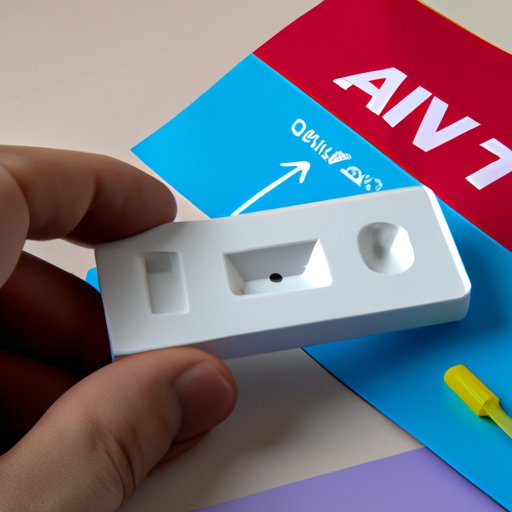Introduction
HIV, or human immunodeficiency virus, is a virus that can lead to AIDS if left untreated. It is important to get tested for HIV as soon as possible, as early detection can help ensure prompt treatment and better outcomes. Fortunately, there are several different HIV testing options available, ranging from standard HIV tests to rapid HIV tests and at-home HIV testing kits.

Exploring the Different HIV Testing Options and How Soon You Can Get Tested
The most common type of HIV test is the standard HIV test, which involves taking a sample of blood from your arm and sending it to a laboratory for analysis. This type of test usually takes several days to process, so results may not be available for up to a week or more.
Rapid HIV tests are an alternative to standard HIV tests. These tests involve taking a sample of saliva or blood from your finger and testing it immediately in the clinic or office where the test is being performed. Results from rapid HIV tests are usually available within 30 minutes.
At-home HIV testing kits are another option for those who want to test for HIV in the privacy of their own home. These kits involve taking a small sample of blood or saliva and mailing it to a laboratory for analysis. Results from at-home HIV testing kits typically take 1-2 weeks to process.
A Guide to Rapid HIV Testing: What It Is and When You Can Take It
Rapid HIV testing is a type of test that can provide results within a short period of time — often within 30 minutes. This type of test is typically done in a doctor’s office or at a public health center. The advantage of rapid HIV testing is that it allows people to get their results quickly so they can take action if necessary.
Advantages of rapid HIV testing include: no need for a lab technician or specialist; results are available quickly; and it is less expensive than other types of tests. However, it is important to note that rapid HIV tests are not always 100% accurate and may need to be confirmed with a standard HIV test.
If you are interested in taking a rapid HIV test, you can usually find testing sites in your local area. Many clinics, hospitals, and public health centers offer free or low-cost rapid HIV testing. Additionally, some organizations, such as Planned Parenthood, offer mobile testing units that travel to various locations throughout the year.
Understanding the Benefits of Early Detection: How Soon Should You Get Tested for HIV?
Early detection of HIV is key to ensuring prompt treatment and better outcomes. It is recommended that everyone between the ages of 13 and 64 get tested for HIV at least once, and those at high risk of HIV exposure should get tested every three to six months. Additionally, pregnant women should get tested for HIV as soon as possible.
If you have recently been exposed to HIV, it is important to get tested as soon as possible. Most HIV tests will detect the virus within two to eight weeks after exposure, but some tests may take up to three months to detect the virus. It is important to talk to your doctor about the best testing option for you.
The Pros and Cons of At-Home HIV Testing Kits
At-home HIV testing kits are another option for those who want to test for HIV in the privacy of their own home. These kits involve taking a small sample of blood or saliva and mailing it to a laboratory for analysis. Results from at-home HIV testing kits typically take 1-2 weeks to process.
The advantages of using an at-home HIV testing kit include: convenience, privacy, and affordability. Additionally, these tests can be done at any time and do not require a visit to a doctor or clinic. On the other hand, at-home HIV testing kits may not be as accurate as standard HIV tests and may not detect the virus until several weeks after exposure.

The Process of Getting Tested for HIV: What to Expect and How Quickly Results Are Available
Getting tested for HIV is a straightforward process. Depending on the type of test you take, you may be asked to provide a sample of blood, saliva, or urine. After the sample has been collected, it will be sent to a laboratory for analysis. Results from standard HIV tests usually take several days to process, while results from rapid HIV tests are typically available within 30 minutes.
At-home HIV testing kits typically take 1-2 weeks to process. Once the results are available, you will be notified by phone, email, or text message. Your doctor or healthcare provider can also provide additional information about the results.
Conclusion
Testing for HIV is an important step in ensuring prompt treatment and better outcomes. There are several different testing options available, including standard tests, rapid tests, and at-home testing kits. Rapid HIV tests provide results within 30 minutes, while standard tests and at-home testing kits usually take several days or weeks to process. It is recommended that everyone between the ages of 13 and 64 get tested for HIV at least once, and those at high risk of HIV exposure should get tested every three to six months.
For more information about HIV testing, contact your doctor or healthcare provider. Additionally, there are many online resources available to help answer questions and provide support.
(Note: Is this article not meeting your expectations? Do you have knowledge or insights to share? Unlock new opportunities and expand your reach by joining our authors team. Click Registration to join us and share your expertise with our readers.)
